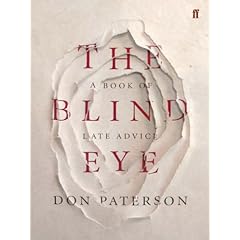 The October 6, 2007 edition of The Spectator (an English weekly with a right-of-center, Olde England bias but wonderful cartoons, chess column, and commentary once the bias is accounted for) contains a “review” of a book The Blind Eye: A Book of Late Advice by the poet Don Paterson (I don’t think the book is available in the US). The review is actually just a collection of 30 or so extracts from the book. The review alone left me chuckling all morning. Some quotes:
The October 6, 2007 edition of The Spectator (an English weekly with a right-of-center, Olde England bias but wonderful cartoons, chess column, and commentary once the bias is accounted for) contains a “review” of a book The Blind Eye: A Book of Late Advice by the poet Don Paterson (I don’t think the book is available in the US). The review is actually just a collection of 30 or so extracts from the book. The review alone left me chuckling all morning. Some quotes:
I can see exactly what not to do at the moment. No doubt through the usual process of elimination, I’ll arrive at my favourite strategy of total paralysis.
I enjoyed L.’s creeping senility. I could have him repeat my favorite stories as often as I wanted, sometimes several times in the space of the same afternoon. X’s sudden lurch into his anecdotage, on the other hand, was a disaster: until then, his shyness had prevented our discovering what a bore he was.
and
You’ve made a blog … clever boy! Next: flushing.
One really hit home for me:
A poem with one line wrong is like a Rubik’s Cube with one square wrong: what it is precisely not is one move away from completion.
I have been looking for an intuitive explanation to various sports leagues on why a schedule that is perfect except for one flaw is likely a long way from a perfect schedule. I will proceed to rip off this analogy and pretend it is my own. I admit that comparing a schedule to Rubik’s cube is not as clever as comparing a poem to the cube: I wonder if I should compare a schedule to a poem?